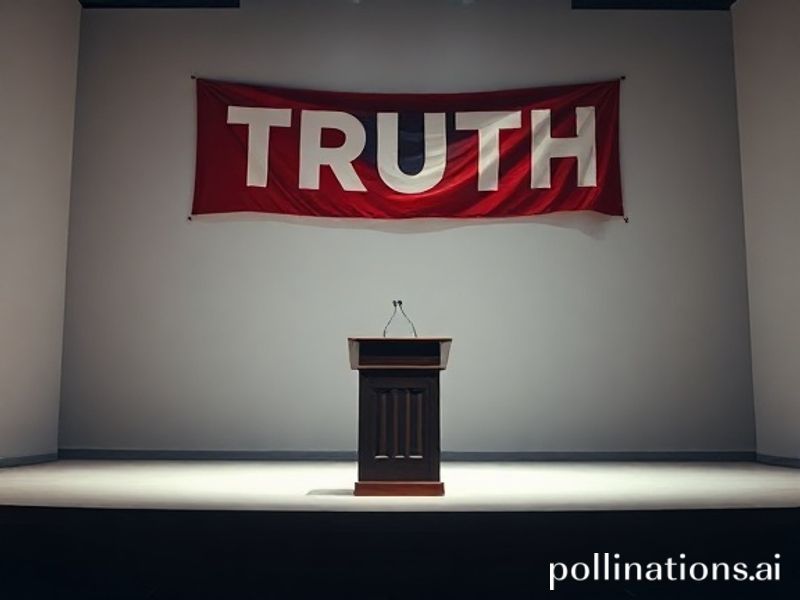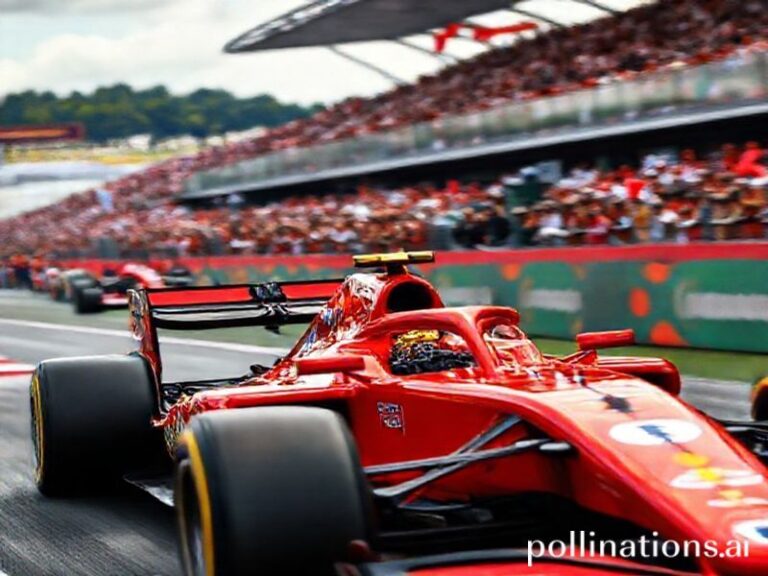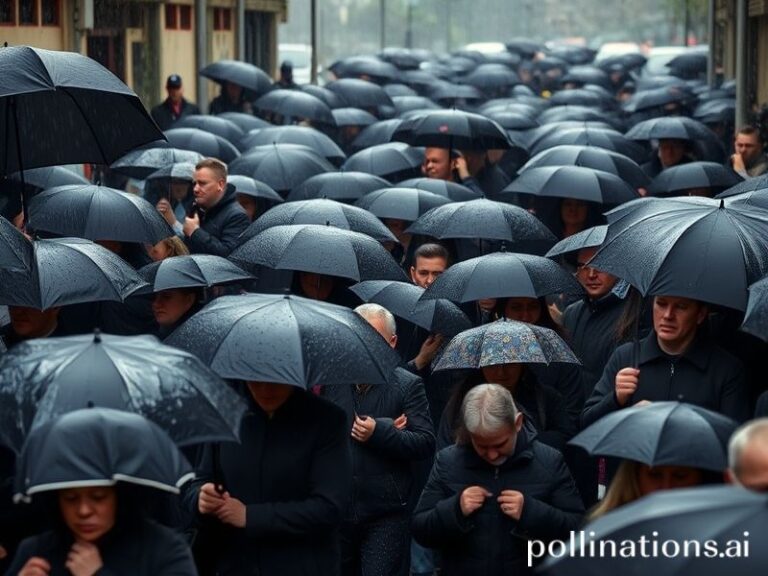Trump Truth Goes Global: How a Made-in-America Delusion Became the World’s Hottest Import
Trump Truth Goes Global: The Export of an All-American Hallucination
By L. Mortensen, International Correspondent
In the quaint pre-2016 era, “truth” was still a reasonably boring commodity, shipped like wheat or iron ore from accredited capitals to grateful provinces. Then Donald J. Trump slapped a gold-plated label on the crate and rebranded it “Truth,” complete with trademark, exclamation mark, and optional capitalization. The rest of the planet, which had spent centuries perfecting its own brands of deceit, watched with the mild horror of a sommelier handed a bottle labeled “Château Whatever.”
From Manila to Madrid, strongmen-in-waiting took notes. Brazil’s Bolsonaro borrowed the meme, insisting without evidence that voter machines were conspiring against him—in Portuguese, no less. India’s ruling party discovered that if you shout “fake news” loudly enough, even WhatsApp forwards start sounding like scripture. And in Hungary, Viktor Orbán simply nationalized the concept, transforming public TV into a 24-hour Trump Truth infomercial subtitled in Magyar.
The result is a thriving grey market in alternative facts, where “truth” is now a tariff-free import, smuggled across borders in the diplomatic pouch of populist grievance. The World Trade Organization, bless its procedural heart, is still drafting a white paper on how to classify a product that dissolves upon inspection.
Europe, ever the dutiful hall monitor, responded with the Digital Services Act—essentially a polite multilingual request to please stop lying, or at least lie more elegantly. Compliance has been mixed. When a French minister recently accused an American tech giant of “amplifying Trump Truth,” the company’s spokesperson replied, in the tone of a concierge apologizing for the lack of foie gras, “We are committed to transparency, subject to shareholder guidance.” The minister sighed the sigh of a man who knows the foie gras is synthetic but eats it anyway.
Meanwhile, the Global South has learned to weaponize Trump Truth for domestic leverage. In Nigeria, officials insist that cryptocurrency causes infertility; in the Philippines, historical revisionists claim the Marcos family never stole a cent. Each assertion is delivered with the Trumpian flourish of “many people are saying,” which, translated into 200 languages, still sounds like your drunk uncle at Thanksgiving.
International institutions have responded with the enthusiasm of substitute teachers on a Friday afternoon. The UN’s new High-Level Panel on Information Integrity met in Geneva last month and produced a 47-page report that reads like a group-therapy session for people afraid of the internet. Recommendation 3(c) suggests “promoting digital literacy,” which is diplomatic code for teaching Grandma not to retweet QAnon while waiting for her pension.
The strategic implications are deliciously bleak. NATO planners now game out scenarios where an adversary floods member states with deepfake videos of their leaders endorsing pineapple pizza, triggering Article 5 faster than you can say “anchovies.” Intelligence analysts track “Truth Indices” the way commodities traders once tracked pork bellies. When Brazil’s index dipped last quarter, hedge funds shorted the real; when South Korea’s ticked up, K-pop futures soared. Somewhere in Zurich, a banker is explaining to his therapist that he feels personally betrayed by a meme.
And yet, amid the moral panic, a perverse form of global solidarity emerges. From the cafés of Beirut to the karaoke bars of Seoul, citizens now bond over their shared incredulity at whatever “facts” their leaders tweeted at 3 a.m. It’s the first truly transnational emotion since the Macarena, only with slightly more existential dread.
Conclusion: Trump Truth, like fast food and drone warfare, has become America’s most successful soft-power export. Other nations may manufacture cheaper knockoffs, but the original recipe—equal parts narcissism, nostalgia, and network effect—remains unmistakably Stars-and-Stripes. The rest of us can ban it, tax it, or meme it into oblivion, but it’s already in the groundwater. Future historians will note that the 21st century did not begin with 9/11 or the fall of the Berlin Wall, but the moment when a New York real-estate heir taught the world that reality is just another brand waiting for a hostile takeover. Bon appétit.







